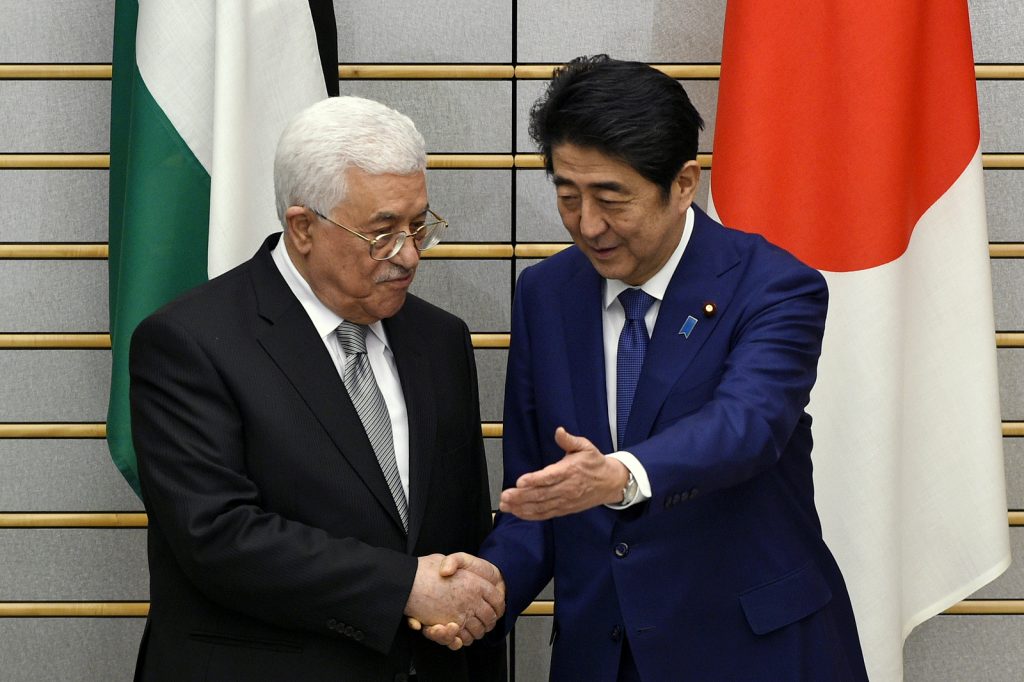
- ARAB NEWS
- 26 Apr 2024

Might Japan be the mediator that peace between the Israelis and Palestinians requires? Could it be that a Far Eastern power holds the key to breaking the deadlock? The Palestinian ambassador in Japan, Waleed Siam, certainly believes this could work. “They (Japan) understand both sides. They know how it feels,” he said this week. And a recent YouGov survey carried out for Arab News showed that 56 percent of Arabs think Japan could be an excellent mediator between the parties.
The current reality, however, is that this prospect is from another galaxy. US President Donald Trump still panders to the delusion that he is the dealmaker-in-chief and he would not want any other party to broker what has been described as the “deal of the century.” Trump has delegated his son-in-law to pull together such a deal and Jared Kushner held his Manama workshop in June. Little has happened since, not least because of the Israeli electoral impasse.
The US is not about to vacate the role it has monopolized ever since the Madrid peace process of 1991. Domestically, the Israeli lobby would be very anxious if that were to be the case. Yet perhaps even this might be challenged if one of the left-wing Democratic presidential candidates prevails in 2020. Bernie Sanders and Elizabeth Warren are parading very differing stances on this issue from previous Democrat frontrunners.
Israel too would not wish any other power to take over from the US. The current Netanyahu administration does not see any role at all for any peace broker, as it pushes ahead with its frenzy of illegal settlement-building, home demolitions and blockade of Gaza. Annexation is on the horizon. Peace talks could interfere with this ever-advancing process of colonization and ethnic cleansing. For Benjamin Netanyahu and his fellow far-right Israeli ideologues, the role of the US is to ensure that any criticism of Israel is kept to a minimum, not least at the UN Security Council, where US vetoes are a guarantee under most presidents, but especially Trump. The Israeli political consensus is to keep the US, as well all other powers including Russia, the EU and Japan, well away from any serious involvement in talks. The role of the latter two powers is to provide funds to keep the Palestinian economy from totally crashing and to ensure the Palestinian Authority can continue to perform its security functions.
Yet will this situation continue forever? Firstly, as a broker, the US has failed in epic fashion. It has been akin to a football referee who only awards penalties and free-kicks to one side. The bias is freely admitted. US presidents publicly declare themselves to be pro-Israel. This is contrary to any healthy process that could deliver peace. Why should the Palestinians ever trust a US president? Bill Clinton ruined any chances of peace by getting into the blame game at Camp David in 2000. Barack Obama insisted on there being a complete Israeli settlement freeze as a precondition for negotiations, but then blinked as Netanyahu ramped up the pressure. The freeze was dropped. So the question remains: Will the parties want to call time on this charade? Who knows, Trump might just proclaim he is ditching Israel and his other allies in the Middle East to allow a complete American exit from the region.
Israeli politics could, in the future, swing away from the far-right toward politicians who might be willing to engage in real rather than sham negotiations. The presence of an alternative, neutral power might be welcomed at some stage down the line, at a time when both parties and peoples truly crave genuine peace.
The presence of an alternative, neutral power might be welcomed at some stage down the line.
Chris Doyle
Could Japan be that power? Well, it does not have the baggage that the EU has in Israel, despite Tokyo formally holding similar positions against settlement-building and demolitions.
Japan also has warm relations with the Palestinian leadership. Just over a week ago, it hostedPresident Mahmoud Abbas in Tokyo, where he met with senior figures including Prime Minister Shinzo Abe, who stated: “Although the outlook for the Middle East peace process is unclear, it is important to resume dialogue with Israel and the United States. Unless peace talks can be resumed, it is unlikely that a two-state solution could be achieved.” He added: “Japan will also spare no effort in seeking to bring the parties concerned back to the dialogue table.” Thus far, Japan has played a crucial role in terms of aid. Its assistance to the Palestinians amountsto $1.9 billion since 1993, making it the third-largest international donor.
Israeli-Japanese ties have also warmed. In the past, Japan’s dependence on oil from Middle East states meant it was seen in Israel as being stuck in the Arab camp. This has changed, not least following two successful visits to Israel by Abe. Japan has also been trying to nudge Iran into being a less disruptive influence in the region.
Ultimately, it all seems fanciful. However sensible, even desirable, it might be for other actors to get a role in the region, the opportunities are not quite there yet. But, if the last few years have shown us anything, it is that nothing is impossible.
Chris Doyle is director of the London-based Council for Arab-British Understanding. Twitter: @Doylech